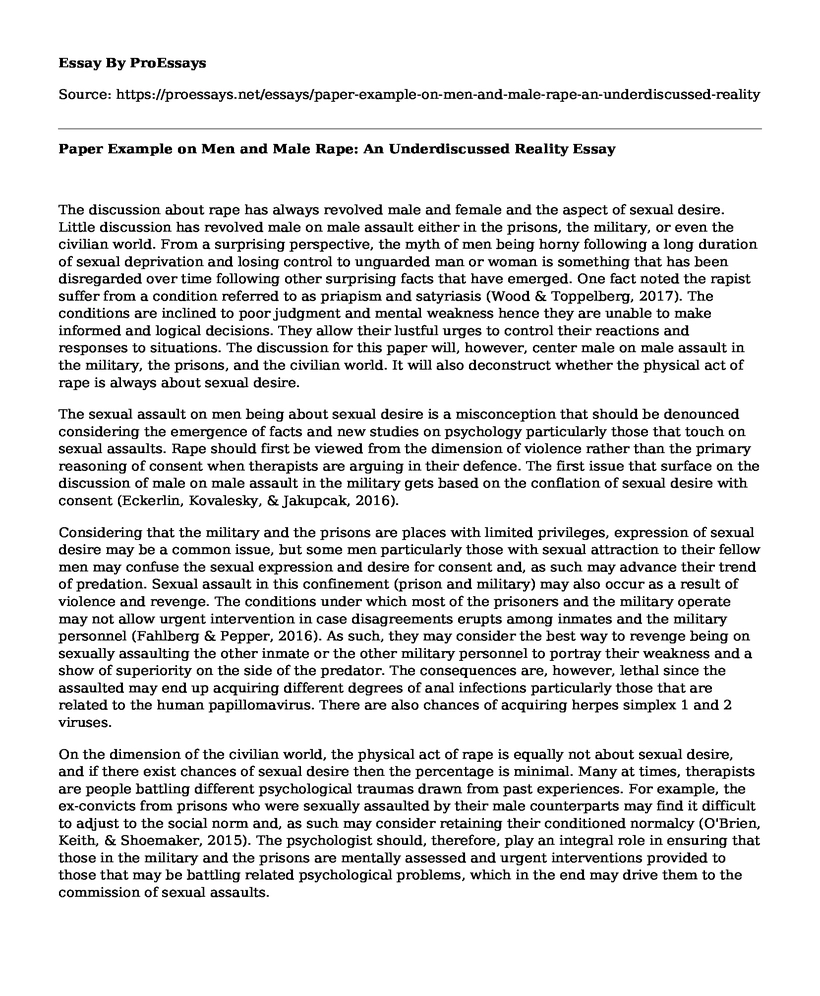The discussion about rape has always revolved male and female and the aspect of sexual desire. Little discussion has revolved male on male assault either in the prisons, the military, or even the civilian world. From a surprising perspective, the myth of men being horny following a long duration of sexual deprivation and losing control to unguarded man or woman is something that has been disregarded over time following other surprising facts that have emerged. One fact noted the rapist suffer from a condition referred to as priapism and satyriasis (Wood & Toppelberg, 2017). The conditions are inclined to poor judgment and mental weakness hence they are unable to make informed and logical decisions. They allow their lustful urges to control their reactions and responses to situations. The discussion for this paper will, however, center male on male assault in the military, the prisons, and the civilian world. It will also deconstruct whether the physical act of rape is always about sexual desire.
The sexual assault on men being about sexual desire is a misconception that should be denounced considering the emergence of facts and new studies on psychology particularly those that touch on sexual assaults. Rape should first be viewed from the dimension of violence rather than the primary reasoning of consent when therapists are arguing in their defence. The first issue that surface on the discussion of male on male assault in the military gets based on the conflation of sexual desire with consent (Eckerlin, Kovalesky, & Jakupcak, 2016).
Considering that the military and the prisons are places with limited privileges, expression of sexual desire may be a common issue, but some men particularly those with sexual attraction to their fellow men may confuse the sexual expression and desire for consent and, as such may advance their trend of predation. Sexual assault in this confinement (prison and military) may also occur as a result of violence and revenge. The conditions under which most of the prisoners and the military operate may not allow urgent intervention in case disagreements erupts among inmates and the military personnel (Fahlberg & Pepper, 2016). As such, they may consider the best way to revenge being on sexually assaulting the other inmate or the other military personnel to portray their weakness and a show of superiority on the side of the predator. The consequences are, however, lethal since the assaulted may end up acquiring different degrees of anal infections particularly those that are related to the human papillomavirus. There are also chances of acquiring herpes simplex 1 and 2 viruses.
On the dimension of the civilian world, the physical act of rape is equally not about sexual desire, and if there exist chances of sexual desire then the percentage is minimal. Many at times, therapists are people battling different psychological traumas drawn from past experiences. For example, the ex-convicts from prisons who were sexually assaulted by their male counterparts may find it difficult to adjust to the social norm and, as such may consider retaining their conditioned normalcy (O'Brien, Keith, & Shoemaker, 2015). The psychologist should, therefore, play an integral role in ensuring that those in the military and the prisons are mentally assessed and urgent interventions provided to those that may be battling related psychological problems, which in the end may drive them to the commission of sexual assaults.
Conclusion
In summary, it is explicit that male on male sexual assault is not driven by sexual desire. It is instead motivated by violence amongst the inmates and those in the military. The other issue that has also surfaced is based on related psychological problems, as noted herein.
References
Eckerlin, D. M., Kovalesky, A., & Jakupcak, M. (2016). CE: military sexual trauma in male service members. AJN the American Journal of Nursing, 116(9), 34-43.
Fahlberg, A., & Pepper, M. (2016). Masculinity and sexual violence: Assessing the state of the field. Sociology Compass, 10(8), 673-683.
O'Brien, C., Keith, J., & Shoemaker, L. (2015). Don't tell Military culture and male rape. Psychological Services, 12(4), 357.
Wood, E. J., & Toppelberg, N. (2017). The persistence of sexual assault within the US military. Journal of Peace Research, 54(5), 620-633.
Cite this page
Paper Example on Men and Male Rape: An Underdiscussed Reality. (2023, Mar 02). Retrieved from https://proessays.net/essays/paper-example-on-men-and-male-rape-an-underdiscussed-reality
If you are the original author of this essay and no longer wish to have it published on the ProEssays website, please click below to request its removal:
- Research Paper on Refugees Issue
- Literary Analysis Essay on My Antonia by Willa Cather
- Essay Sample on The AA Meeting: Not What I Expected
- Essay Example on Poverty's Impact on Today's Issues of Violence
- American Revolution: Women and Its Impact on Social Class - Essay Sample
- Essay Example on Marijuana Abuse: Memory Effects and Addiction Risk
- Essay on Substance Misuse: Women at Higher Risk for SUD & Health Complications







